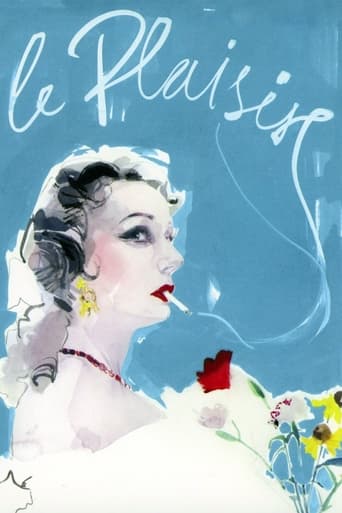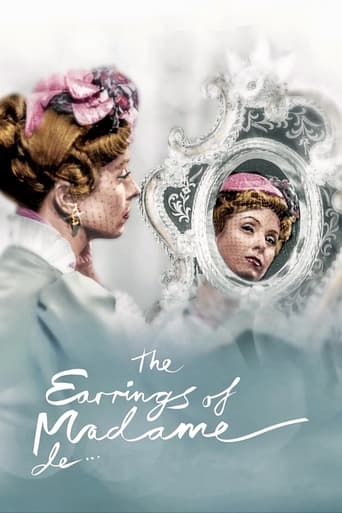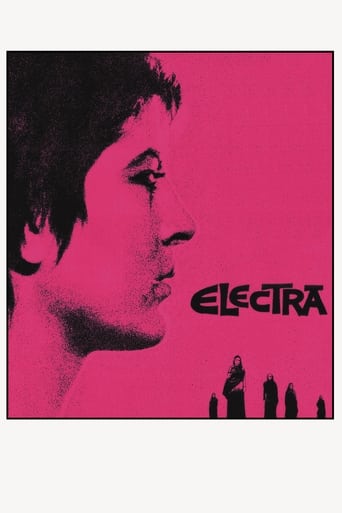


Le Plaisir
Three stories about the pleasure. The first one is about a man hiding his age behind a mask to keep going to balls and fancying women - pleasure and youth. Then comes the long tale of Mme Tellier taking her girls (whores) to the country for attending her niece's communion - pleasure and purity. And lastly, Jean the painter falling in love with his model - pleasure and death.
-
- Cast:
- Claude Dauphin , Gaby Morlay , Madeleine Renaud , Ginette Leclerc , Mila Parély , Danielle Darrieux , Pierre Brasseur


Reviews
Undescribable Perfection
Thanks for the memories!
Excellent adaptation.
It’s not bad or unwatchable but despite the amplitude of the spectacle, the end result is underwhelming.
This film feels far fresher today than Ophuls' other drawn-out melodramas. An omnibus collection of Maupassaunt short stories, filming a collection of brief narratives seems better suited to the director's style and curtailing his excesses.The first and third of the fables are the most satisfying, with strong points and a wonderful blend of magic, realism and irony setting the tone.The central story, is however, far weaker. The longest piece, it meanders relentlessly and ultimately feels pointless and lacks enough dramatic interest to keep the audience engaged.This weak centre piece does not undermine the film as a whole, however, and it remains an enjoyable piece of artistry.The costumes are excellent and convey a sense of time and place, rooting the fables firmly within fin-de-siecle France. The lighting and sets also serve the same purpose. The acting is strong and the dialogue is direct.Due to the shortness of each segment pacing, which is normally one of Ophuls' major weaknesses, does not present itself as a problem here.The first story, that of the masks, is playful in the sense that it present an actor playing a character who is playing a role of his own. The artifice of the magical mask reflects the artifice of cinema itself.Despite the fantasy element, the character is thoroughly believable in his motivations and remains highly memorable.In the last story, the line between illusion and reality is also shattered when the beautiful artist's model becomes a cripple. Her beauty is captured for eternity in the art whilst she remains wheelchair -bound yet content for her husband, who did not appreciate her when she was mobile, only now fully appreciates her when she is no longer whole.In conclusion, this film is a chocolate box of delicacies with lovely costumes, sets and interesting fables. It is Ophuls' most satisfying work, avoiding the soap opera excesses of his lengthier melodramas and has moments of real dramatic interest. It is worthwhile seeking out.
There is a certain mood that I am subject to which can be satisfied only by a sunny, quiet, late Sunday afternoon on the couch with Maupassant. (I suspect that Proust would do even better but I lack the stamina.) My wife and I discovered Ophuls by watching The Earings of Madame de... on instant Netflix. When I saw that Le plaisir was Maupassant my heart leaped and, after viewing it, I can now report that the film is as exquisite as the stories themselves (minus the soft Sunday afternoons, of course).The film contains three stories each of which depict an aspect of pleasure: the pleasure of youth, the pleasure of innocence and the pleasure of fate.The second tale, La maison Tellier ('Madame Tellier's Establishment' in my translated collection of Maupassant stories) is the centerpiece of the film. It describes a trip to a small country village by a madame and her platoon of lovable ladies in order to attend the first communion of her nephew where pleasure meets innocence. The scene in the church where Rosa, overcome with memories of her lost innocence, starts to weep and then everyone in the church is soon weeping, is one of the most poignant I have ever seen on film. It is a depiction not only of the seriousness of lost innocence but it's universality as well and serves to show Rosa's sins, on display for all to see, joined in one spontaneous flood of remorse and gratitude by the hidden sins of all the respectable village folk. See if you don't fall into tears as well.If you have not read Maupassant, doing so before viewing the film will heighten your enjoyment. For those who have decided to view the four major Ophuls films, I offer the opinion that this is the best of them and would be a good place to start.Social Commentary: Never having visited France, I cannot say whether the charming French idea of innocent naughtiness has given that country a better life. But if the concept of 'a little sin is the spice of life' adds something to the life of the well off (and I doubt it), it certainly does not work for the poor. Drive through any blighted urban neighborhood for the proof. So-called rigid bourgeois values may not make for good stories or movies but they are essential for those who have it in mind that their children do well in school and go on to live decent lives. Enjoy these stories and, yes, acknowledge the hypocrisy of middle class morality, but do not transplant la belle vie into your own family or you will live to regret it.
Is it possible to take one of the best tales in French literature and make a film even better out of it? Yes, it is. The tale is Maupassant's "La maison Tellier", the film-maker is Max Ophuls, the film is "Le Plaisir". In fact, the movie is divided into three episodes, corresponding to three Maupassant's tales. In the two short introducing and final stories we actually find the bitter, acid, misanthropical sarcasm typical of Maupassant's style, though softened by Ophuls' sympathy for human unhappiness. What really stuns the viewer is the central episode, the sumptuous narration of "La maison Tellier". The story is the same in the book and in the film. A bunch of prostitutes from "La maison Tellier", the brothel of a French province town, takes a day off to go to a First Communion celebration in the countryside. But what a difference of mood. The fact is that Maupassant detested and despised people, while Ophuls manifestly loves them and is always ready to forgive their faults and pettiness. Therefore the writer's aggressive satire is replaced by the director's gentle sense of humor. The brothel is closed, and we shortly realize that the balance of the town, the whole social order is upset. Some sailors start a brawl, and that looks rather expectable. But even peaceful middle-class respectable citizens, long-time friends, begin to quarrel bitterly. "La maison Tellier" is the key of social stability!Then the church-scene, a perfect blend of sweet fun and profound human feeling. Overwhelmed by the intense emotion of the First Communion Mass, the prostitutes burst in tears, and they carry all the villagers with them. I guess to have noticed a delightful nuance by Ophuls. The "beautiful Jewish girl" whom, according to the director (a Jewish himself), no brothel can afford to miss (!), at first tries to restrain herself. She's not Christian, she's not supposed to be moved! But, of course, she soon starts to weep... Great emotion, great art! And the women merged in the high grass, picking flowers... it's late, they risk to miss their train... but no! It's so a gorgeous day, let's go and pick some flowers! How poetic, how beautiful... what a fantastic scene! Needless to say, as soon as the women are back, peace, order, friendship are restored in the town.The above comments can give a partial idea of the director's extraordinary treatment of the story. But it's important to remark that just the visual beauties and the camera work by the genius Ophuls are largely enough to place "Le plaisir" among the best works in the history of cinema. Let me just mention the first scene, when we peep inside the brothel together with the outside eye of the camera, which jumps from a window to another like a little bird. That is the most brilliant cinematic idea I can remember. A perfect film forces a perfect job by the cast. And in fact the acting is magnificent."Le plaisir" is a profound study of human beings, of their joys and sorrows, an instance of superlative good taste in treating a risky theme, a triumph of clever cinematic technique. A peak of the art of cinema.
One of Max Ophuls' finest achievements,one of the best Guy de Maupassant adaptations for the screen.This is a movie made up of three sketches;it is rather a long story (la maison Tellier) framed by one prologue (le masque) an an epilogue (le modèle).Guy de Maupassant is ,by far,the best writer France as ever known,as far short stories are concerned-He wrote about 200 of them,and even influenced Dudley Nichols for the screen play of "stagecoach"(actually ,Claire Trevor was Boule de Suif)Le plaisir (the pleasure) is something fleeting,but the hero of the prologue(le masque) can't stand life is passing him by.His wife is a victim,women are often sacrified in Maupassant's work.At best they are ways for men to social advancement(Bel Ami,see "the private affairs of Bel-Ami", filmed by Albert Lewin ,1947,watchable,but which has given a totally false rendering of the conclusion),at worst ,once their lover or husband has used them ,they are often deserted (see "une vie" , directed by Alexandre Astruc,1958,which has a fine Claude Renoir cinematography."La maison Tellier" is the main body of the work:the subject is scandalous:madam and her whores close the brothel and head for the country.There,they are to attend madam's niece's communion.Max Ophuls has not always been faithfull to Maupassant:if you read the short story,you will realize how much these women are ugly,vulgar and fat;here ,we've got gorgeous Danielle Darrieux,plus Ginette Leclerc and Madeleine Renaud.Ophuls is an esthete and he could not subscribe to Maupassant's depictions.The two men come together when it comes to describe the reactions of the inhabitants of the village:the prostitutes pass for grandes dames,well educated,chic,and when they enter the church,it seems as if they enhance the religious fervor !!Maupassant,who was anticlerical to a fault,lets his irony flow;but there's compassion in Max Ophuls'pictures and I'm not sure the tears his heroines shed are that much laughable:regaining a child's soul -particularly on this communion day- is many a human being's secret longing.But cynism get the upper hand quickly and madam's brother,a bawdy Jean Gabin (the father of the little girl making her communion),is much more interested in his sister's "residents" than spiritual elevation.This second part climaxes the movie,with its steam-powered train,its banquet,its brothel of which the shutter are closed -we're only allowed to have a glimpse behind them-The movie opens and closes the same way:woman is born to be deserted when she's not a whore,like in the second sketch.Josephine (Simone Simon) will find her lover back but the price she will have to pay is terrifying.Why "le plaisir" ?Pleasure is few and far between in this world.Pleasure walks hand in hand with suffering.Guy de Maupassant himself knew fleeting pleasures he describes in part 2,but if you read his biography,you 'll meet a tormented soul,an extremely pessimistic mind,and a faux bon vivant who lived a dissipated life which ended in madness.This is one of the most absorbing,ambitious,complex and artistically successful masterwork of the French fifties.


